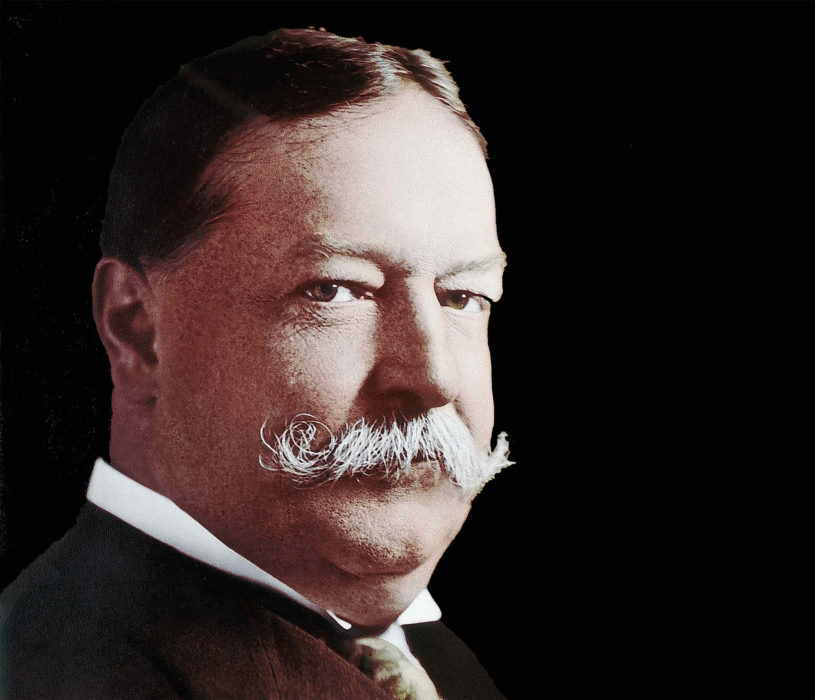CLEAR SKIES ACROSS THE country east of the Rocky Mountains promised a big turnout at the polls on this Election Day, November 5, 1912.
President Taft arrived in Cincinnati last night at half-past seven, about two hours after ‘Abdu’l-Bahá’s train had pulled in from Chicago. But whereas ‘Abdu’l-Bahá had arrived quietly, a throng of ten thousand people turned out at the train station to greet Taft, their city’s favorite son, many of them workers who had missed their suppers in order to catch a glimpse of the President. Taft got into an automobile while a brass marching band played. He was driven north through downtown toward his brother Charles’s house on Pike Street, while green and red fire lit up the sidewalks and an impromptu parade formed around the car.
William Howard Taft stood six-foot-two and weighed 330 pounds. To see him you’d expect that he spent most of his time sitting on the couch with a beer. But Taft was a teetotaler, light on his feet, a good dancer, and a master horseman. While Taft was Governor of the Philippines under President Roosevelt in 1903, news arrived at the White House one day that he had just finished a twenty-five mile ride. Elihu Root, the Secretary of War, promptly cabled Manila: “HOW IS THE HORSE?” And Taft loved to laugh at his own jokes. His biographer Henry Pringle wrote that the President’s laughter began softly, a “trembling of his ample stomach.” His chuckle became louder as his story continued, and, paired with an expansive grin, rumbled from his frame, often eliciting laughter from his audience before he had even finished the tale.

‘Abdu’l-Bahá had planned to depart Cincinnati early this morning, but he had so many visitors he couldn’t leave. At the Grand Hotel, on Central Avenue at 4th Street, he talked of the President. “I am most grateful to President Taft for having extended his influence toward the establishment of universal peace,” he said.
Taft had spent much of his presidency signing arbitration treaties with America’s sister republics in Central and South America. Yesterday in New York, Andrew Carnegie had made the same point to a New-York Tribune reporter. “Above all his services we should rank his untiring efforts for international peace,” Carnegie said. “He is emphatically the great peace preserving official of our day.”
But, as ‘Abdu’l-Bahá explained, treaties of arbitration between nation-states were only the first step in Bahá’u’lláh’s comprehensive plan for global peace, and the chance to achieve it was uniquely America’s. America, he said, “is at peace with all the world and is worthy of raising the flag of brotherhood and international agreement. When this is done, the rest of the world will accept. All nations will join in adopting the teachings of Bahá’u’lláh revealed more than fifty years ago. In His Epistles He asked the parliaments of the world to send their wisest and best men to an international world conference which should decide all questions between the peoples and establish universal peace. . . . Its accomplishment would be more far-reaching than the Hague tribunal.”
When ‘Abdu’l-Bahá’s train pulled out of Cincinnati’s Union Central Railroad Depot at noon, bound for the nation’s capital, President Taft was again in the backseat of his car. He had little regard for the speeding limits, and on many occasions he would try to outrun the police, leaving them covered in dust and never knowing whom they had been chasing. But today, with all eyes on him, he was smiling to the crowds on his way to cast his vote in Precinct M of Cincinnati’s Third Ward, at 2008 Madison Road. The President spent the five full minutes in the voting booth, filling out six separate ballots for federal, state, and local offices.
“What he has accomplished in making treaties with various nations is very good,” ‘Abdu’l-Bahá said in praise of President Taft, “but when we have the interparliamentary body composed of delegates from all the nations of the world and devoted to the maintenance of agreement and goodwill, the utopian dream of sages and poets, the parliament of man, will be realized.”






